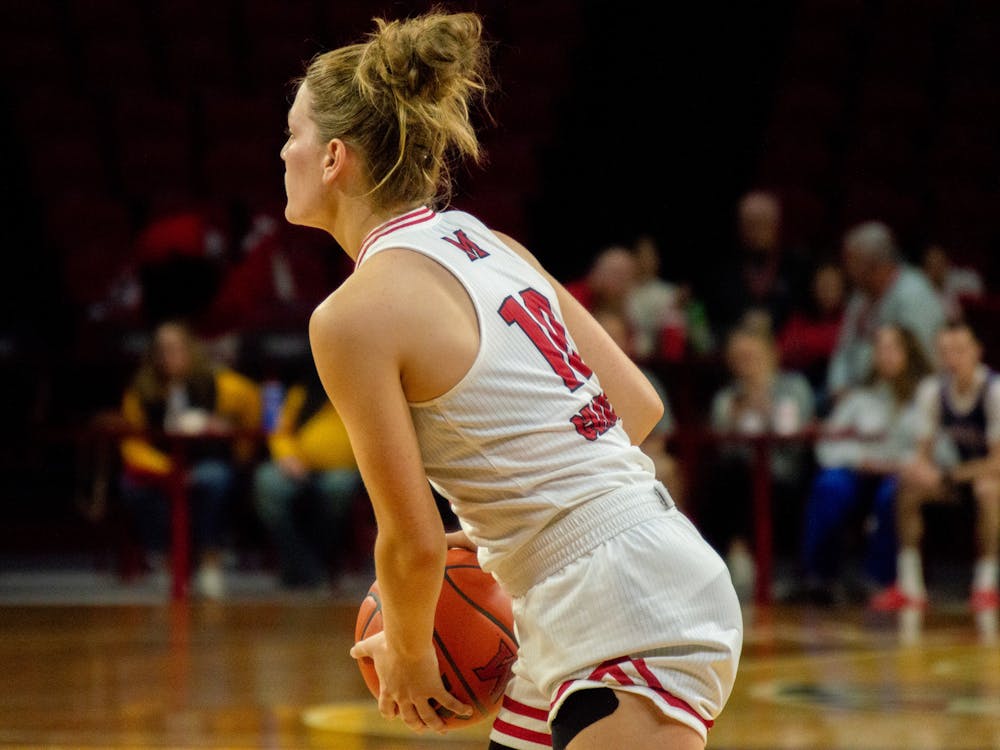I was probably 3 or 4 the first time I heard what I hope to be the voice of God.
Or, at least, that’s what I like to say — half joking, half serious.
My dad drove. I sat in a booster seat behind him as we rode around the Price Hill neighborhood of Cincinnati in his gold 1972 Oldsmobile Cutlass. The sun shone, and the car’s convertible top was down. My dad tuned the staticky, old radio to 700 WLW, and I heard Marty Brennaman call a Reds baseball game for the first time I can remember.
It’s one of my first memories.
My age sets the year right around 2002 or 2003, almost 30 years into Brennaman’s tenure as the play-by-play announcer of the Cincinnati Reds and the de facto voice of the city itself. He retired last Thursday after 46 iconic seasons.
He connected Cincinnati fans with their favorite team for nearly five decades, articulated the Reds’ three most recent world championship victories and was appropriately placed in the National Baseball Hall of Fame in 2000.
In Cincinnati, he earned first-name status. No one in the city calls him his full name. He’s simply “Marty.”
In my life, I’ve spent more time listening to Marty than anyone else, bar my family members.
My dad was 7 when Marty announced his first Reds game. I was 7 when I became a baseball fan, and Marty has everything to do with that. Along with my dad, he taught me the game.
During his season-long retirement tour, Marty said, “I’ve put more people to sleep than you could shake a stick at.”
For me, he was correct.
My mom enforced an 8:30 p.m. bedtime for much of my childhood. Many nights, I lugged a blue radio that looked like a boombox with rounded corners to the edge of my bed and flipped on 700 WLW.
Enjoy what you're reading?
Signup for our newsletter
My mom always knew.
Sometimes, she stopped me. Sometimes, she pretended she didn’t hear it, so I could have my fun.
I always tried to hold off my sleepiness until Marty’s signature “... and this one belongs to the Reds” tagline. I rarely made it to the end, dozing off and waking only to power off the radio as Marty signed off, “So long, everybody.”
Until I was 12, I had a great-grandma who lived in Middletown, Ohio. Because of the 45-minute drive from my family’s house to hers, my brothers and I lovingly referred to her as “Grandma Far Away.” She spent almost every Sunday with my family.
When we visited her, we’d arrive to the Reds game on the television in her front room or the radio in her kitchen.
When we picked her up from Middletown, I always volunteered to go with my parents. It meant more time with grandma and more time with Marty. I often fell asleep while taking her home on Sunday evenings, as my grandma’s and parents’ murmurs and Marty’s smooth pronunciations slid into my dreams.
Spring training in February brought along the best time of year. I’d move the blue radio from the top of my dresser down to my floor and sit right by it, as Marty led me from the first pitch to the last.
Each July, I’d beg my parents to leave our annual Florida vacation at certain times. I tried to align the time we’d reach WLW’s signal in Tennessee with the start of the night’s Reds broadcast, allowing Marty to welcome us back to town.
My dad and I talked Reds together and always had the game on in the car. He followed Marty’s “there’s a high drive” home-run shout with his own “all right!” and a high-five for me.
Even now, my friends and I recite our favorite Marty calls from memory. I remember exactly where I was for most of them.
Ken Griffey Jr.’s 500th and 600th home runs, a 2006 Adam Dunn walk-off grand slam, Jay Bruce’s division-clinching blast in 2010 and Joey Votto’s 2012 Mother’s Day grand slam winner.
Those are only the ones from my lifetime. I listened to Marty for only a third of his Reds career. But, no one has ever told me I missed his prime. He was at his best last Thursday, just like any other game that happened 10, 20, 30 or 45 years ago. I wasn’t shortchanged.
Marty was on the radio the first time I drove a car. He kept me from crying on the way home from my first-ever breakup. He rode with me to friends’ houses and home from school.
I studied every one of his broadcasts I could find on YouTube before making my debut as a baseball play-by-play announcer on RedHawk Radio. I even bought a transistor radio, so I could listen to him in my dorm room.
Birthdays, holidays, graduation parties, average Tuesdays and everything in between, he was there.
Despite that, I’ve never met him.
Last year, when I shadowed Fox Sports Ohio’s Chris Welsh for a day, I came within 20 feet of doing so.
Welsh asked if I wanted to meet Marty. I started walking toward the WLW radio booth before “yes” made it past my lips.
Welsh opened the door. Marty stood in the middle of a group of people. He, of course, was telling stories as the center of attention. Everyone smiled.
I didn’t, as Welsh said, “Ope, he’s busy,” and shut the door.
On Thursday, when Marty finished his last broadcast and closed the door on his career, I cried.



